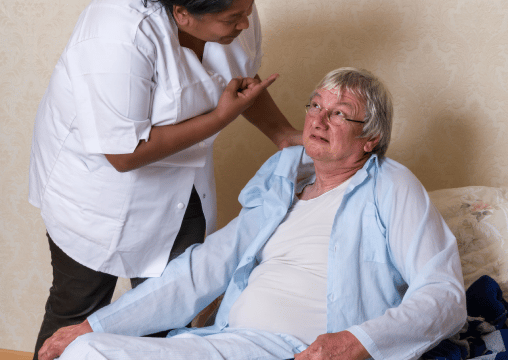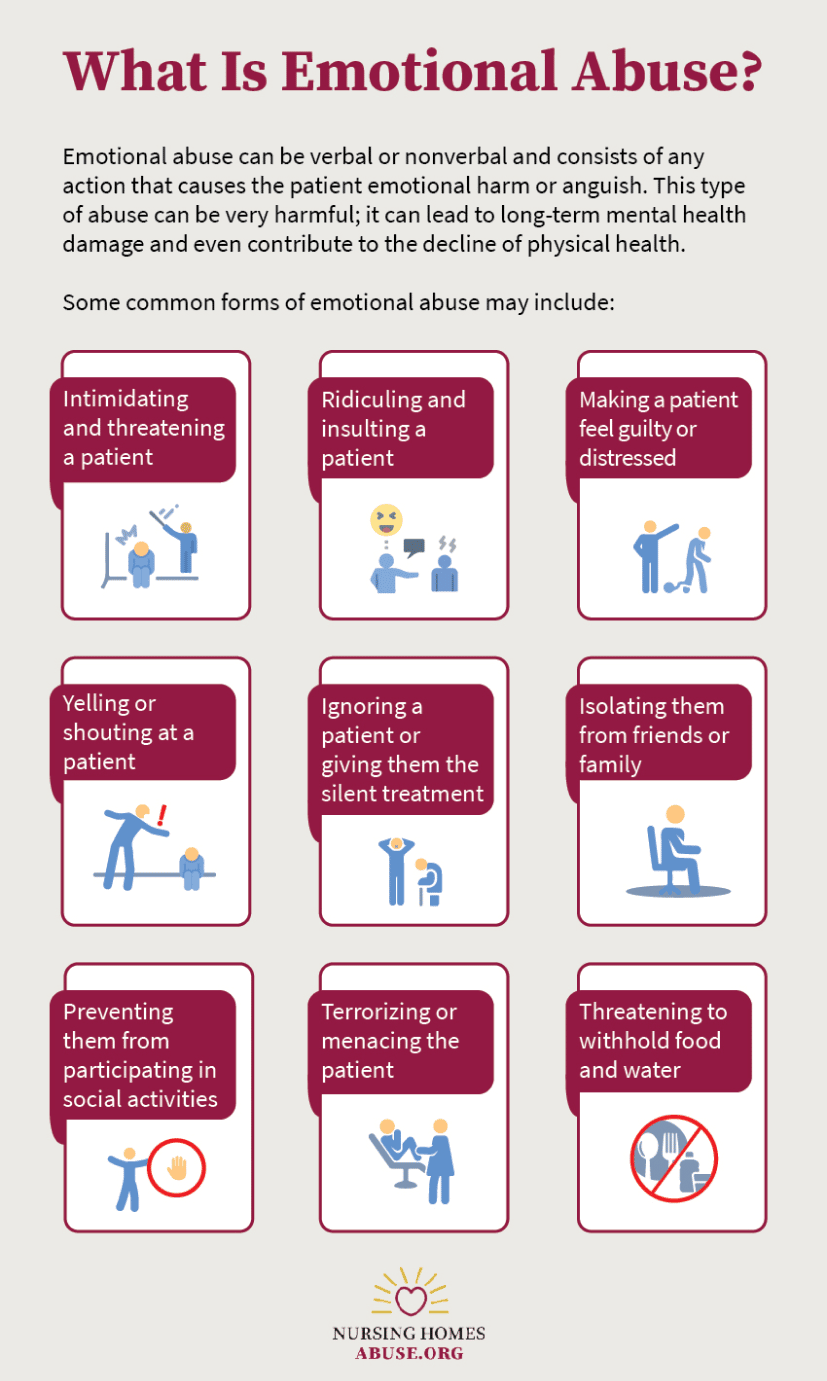Emotional Abuse in Nursing Homes

Home ▸ Nursing Home Abuse ▸ Emotional Abuse
When an elderly person lives in a nursing home, they are subject to the care of their nurses and doctors. Depending on the state of their health, they may not have the cognitive facilities required to let others know if they aren’t being treated fairly by their caregivers. They also may be scared to do so.
Elderly people may become unwitting victims of abuse. Unfortunately, a number of patients are treated poorly during their stay at nursing homes.
A survey conducted by the National Center on Elder Abuse found that 33.4% of nursing home residents experienced emotional abuse within the past year. Those with disabilities or other frailties may be more likely to experience mistreatment.
What Is Emotional Abuse?

Emotional abuse can be verbal or nonverbal and consists of any action that causes the patient emotional harm or anguish. This type of abuse can be very harmful; it can lead to long-term mental health damage, and can even contribute to the decline of physical health. Elderly patients who experience emotional abuse may feel extreme sadness, fear, and anxiety.
Some common forms of emotional abuse may include:
- Intimidating and threatening a patient
- Ridiculing and insulting a patient
- Making a patient feel guilty or distressed
- Yelling or shouting at a patient
- Ignoring a patient or giving them the silent treatment
- Isolating them from friends or family
- Preventing them from participating in social activities
- Terrorizing or menacing the patient
- Threatening to withhold food and water
Emotional abuse can be very frightening to an elderly person, especially if they don’t have recourse to stop it. It is also the most common form of abuse experienced. Other types of abuse include financial, sexual, or physical abuse and neglect.
What Are the Symptoms of Emotional Abuse?
There are a number of symptoms that may be present if an elderly person is experiencing emotional abuse. Initially, these may be difficult to spot. However, as the abuse progresses, indicators that something is wrong may become more evident.
Psychological abuse causes many people to become timid, withdrawn, and depressed. In other cases, they may become more agitated and angry.
Signs that an elderly individual is being abused may include:
- Depression and withdrawal
- Refusal to interact or speak with others
- Sudden change in personality or behavior
- Agitation
- Excessive fear or nervousness
- Unusual behavior such as sucking, biting, or rocking
If the abuse continues, physical symptoms may begin to manifest. These can include:
- Loss of appetite
- Lack of sleep or insomnia
- Sudden weight loss
- Refusal to eat or take medications
- Increased vulnerability to injury and infection
If you witness an elderly person exhibiting these symptoms, notify an independent party who can assist with making sure they receive the care they need.

Emotional Elder Abuse Risk Factors
In general, the older the elderly individual is and the more severe their illness, the more likely they are to be abused.
Other significant risk factors include:
- Divorce or separation
- Mental or physical impairments
- Low income
- Race
- Increased need for help with daily living tasks
Those with severe memory impairment or cognitive problems are more susceptible to emotional elder abuse.

Who Can Commit Emotional Elder Abuse?
Anyone may commit emotional elder abuse, including family members, nursing home staff, or other caregivers. Those who spend the most time around the elderly person are more likely to be perpetrators of the abuse.
Family Members
Unfortunately, some family members may engage in emotional elder abuse. This commonly occurs when a family member is reluctant to care for an elderly relative but agrees to do so anyway. It may also happen when the family member is stressed, has anger management issues, or is under the influence of a substance such as drugs or alcohol.
Nursing Home Staff Members
Staff members at nursing homes are supposed to provide adequate care to their patients. However, staff may also become overworked and frustrated, leading to the potential for emotional abuse. According to the US Department of Health and Human Services, the number of Americans that are age 65 or older increased by 36% between 2009 and 2019, and this number is only expected to grow. With the increased demand for patient care and dwindling numbers of nurses, staff quickly becomes overworked and overwhelmed. When nursing home staff members are overworked, there’s an increased risk of poor service quality and unsafe resident conditions.
Other Caregivers
Anyone who is around the elderly patient may commit emotional abuse. It’s important to pay attention to the mannerisms of the patient to determine whether they’re exhibiting signs of abuse. If their behavior deviates from its normal standard, make sure to notify someone who can assist, such as a medical professional or social services.
How Is Emotional Abuse Treated?
If you believe that your loved one is being emotionally abused at a nursing home, you may need to move them to another facility.
Stopping the abuse and getting your loved one appropriate treatment is critical. Otherwise, your loved one may experience additional issues, such as anxiety or depression, and a worsening of any current medical problems.
The symptoms of psychological or emotional abuse may be treated in a number of ways.
Counseling
A social worker or other mental health care provider may assist the elderly person with the depression, anxiety, and fear caused by the abuse.
Medications
In some cases, medications may be useful to help your family member calm down, relax, have an improved mood, or sleep better. These medicines might include antidepressants or anti-anxiety medications.
Medical Care
If the abuse caused a physical condition to worsen or a new medical condition to appear, such as digestive problems, severe headaches, hypertension, fibromyalgia, or chronic fatigue syndrome, the elderly person could need other medical treatments or medication to treat their illness.
What Should You Do If You Suspect Elderly Emotional Abuse?
Whether you are a family member or friend of a nursing home resident or an employee of a nursing home, you should always be alert for signs of abuse of the elderly.
Many elders aren’t in a position to defend themselves or to ensure that they are being treated fairly. Checking in on them regularly and notifying staff if there appears to be an issue can ensure that they maintain their well-being in their later years.
If abuse seems to be severe or continuous, it is important to report it, document it and give details of signs and patterns to the nursing home administration.
If nothing changes, reach out to your state government for assistance. They have nursing home abuse advocates who work on behalf of elderly individuals who are residents in nursing homes or other similar facilities.
The Administration of Aging oversees the Long-Care Ombudsman Program. You can find the contact information for your state through the Consumer Voice website.
In addition to the Long-Care Ombudsman Program, Adult Protective Services can also assist with filing a report of suspected elderly abuse.
